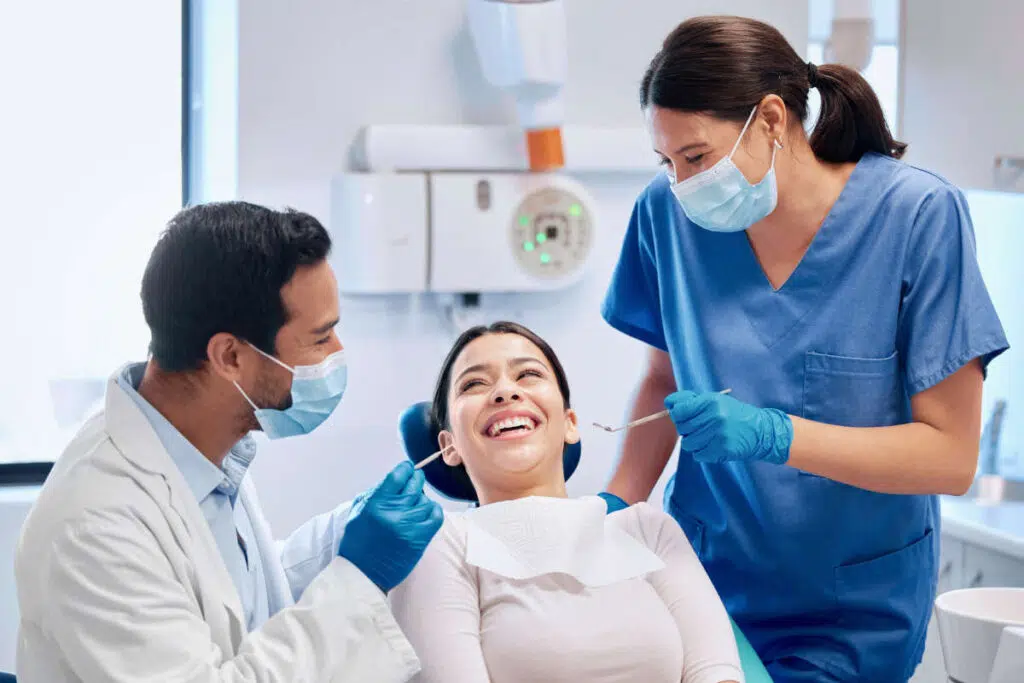
Medical doctors typically have either MD or DO after their names, letting you know the type of medical education they received. The same is true for dentists. Dental professionals can be either Doctor of Dental Surgery (DDS) or Doctor of Medicine in Dentistry or Doctor of Dental Medicine (DMD).
The Path to Earning a DMD or a DDS Degree
Many dentists get on the path to earning either a DDS or a DMD early. Just as students who hope to become doctors one day often take a pre-med course in college, students who plan on being dentists are encouraged to follow a pre-dental or pre-health professions course or major. That can involve taking a number of prerequisite science courses, such as organic chemistry, biology, and physics, as well as participating in a dental students’ club or organization.
For the most part, aspiring dentists apply to DMD or DDS degree programs about a year ahead of time. One of the application requirements is taking the Dental Admissions Test (DAT). Like other admissions tests, the DAT is divided into several sections, including quantitative reasoning, reading comprehension, perceptual ability, and natural sciences. The test is scored by section, and each score can be between 1 and 30. Typically, students who are admitted to dental school need a score of at least 19.
Before a college student applies to dental school, it can be a good idea for him or her to shadow a dentist who works in the community. Job shadowing lets a student see what life is like on the job and the day-to-day workings of a dental practice. It can also give a student a fair idea of whether pursuing a career in dentistry is the best option.
Requirements for the DDS and DMD Degree
To become a general dentist, a student needs to complete four years of dental school, ending up with either a DDS or DMD. The first two years of dental school primarily focus on instruction in the lab and classroom, covering health science topics and focusing on how those topics relate to dentistry. Students don’t work with live patients yet during the first two years, but will usually train on models and mannequins. At the end of the second year, it’s common for students to start seeing some patients.
By the third year, dental students are usually working with real patients, but under close supervision from their professors and instructors. The focus of patient treatment during the last two years of dental school is usually on general dentistry topics. Students also tend to study the basics of running a dental practice and general business management during the last two years of dental school.
DDS and DMDs After Dentistry School
After a student graduates from dental school with either a DDS or DMD, the next step is to become licensed. DDS and DMDs need to take the National Board Dental Examination, which is a pass or fail test. In some cases, the exam is taken before a student leaves school, along with other members of the dental class. Some states also require a dentist to pass a separate state or regional exam before earning a license to practice in that area.
Unlike medical doctors, who generally complete additional years of training in a residency, once a dental student graduates and earns his or her license, he or she can go into practice as a general dentist. Those are the dentists who focus on examining and cleaning the teeth, as well as on diagnosing conditions or directing students to dental specialists.

The American Dental Association recognizes nine dental specialties. Here is where the differences between dentists come into play. A specialist, such as a periodontist, who treats gum disease, receives additional, specialized training after dental school. Specialties include pediatric dentistry, oral and maxillofacial surgery, endodontics, orthodontics, periodontics, oral pathology, oral radiology, dental public health, and prosthodontics.
Why the Different Dentist Degree Names?
If a DDS and a DMD are the same thing, why are there two dental degree names? A DDS degree was the original degree title given by schools. Today, more dental education schools in the US give DDS degrees than DMD.
In the 19th century, Harvard began offering a dental school. It was the practice of the university to write its degrees in Latin. When translated into Latin, Doctor of Dental Surgery becomes “Chirurgae Dentium Doctoris,” which doesn’t have the same ring to it. So, the school renamed the degree “Dentariae Medicinae Doctor,” or Doctor of Medicine in Dentistry, which sounded better.
What This Means for Patients
In the end, the different degree names don’t matter much for patients. Whether you pick a DDS or DMD, you’re working with a dentist who has successfully passed medical school and the required exams. Where things start to matter is when it comes to experience and training in certain specialties.
For example, if you have gum disease, it is recommended to find a periodontist, rather than a general dentist. In fact, your general dentist might refer you to a particular specialist so that you can get the treatment you need.
At Gallardo in Miami, Florida, Dr. John Paul Gallardo is a DDS. He is a periodontal specialist. No matter what your dental concern is, from gum disease to a missing tooth, schedule a FREE consultation with the specialists by calling (305) 447-1447 today.